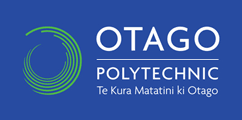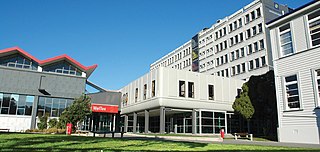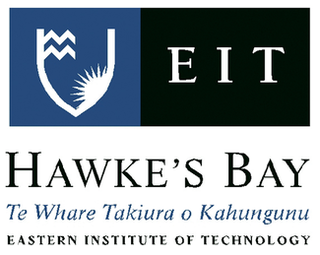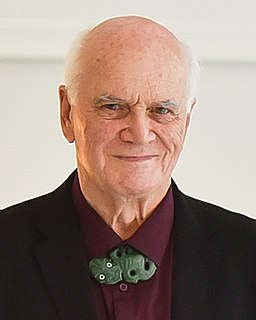Related Research Articles

Victoria University of Wellington is a university in Wellington, New Zealand. It was established in 1897 by Act of Parliament, and was a constituent college of the University of New Zealand.

Public sector organisations in New Zealand comprise the state sector organisations plus those of local government.

Auckland University of Technology (AUT) is a university in New Zealand, formed on 1 January 2000 when a former technical college was granted university status. AUT is New Zealand's third largest university in terms of total student enrolment, with approximately 29,100 students enrolled across three campuses in Auckland. It has five faculties, and an additional three specialist locations: AUT Millennium, Warkworth Radio Astronomical Observatory and AUT Centre for Refugee Education.

University Challenge is a long-running New Zealand television quiz show, running originally from 1976 to 1989 before its revival in 2014 after a 25-year hiatus. The format was based on the British show of the same name, which was itself based on the American College Bowl. The 2014–2017 series were produced by Cue TV in Invercargill.
The Aotearoa Student Press Association is an association of eight student newspapers and magazines that are published by the student associations of universities and polytechnics in Aotearoa. The Aotearoa Student Press Association has an associate membership in the New Zealand House of Representatives press gallery.

Otago Polytechnic is a public New Zealand tertiary education institute, centred in Dunedin with additional campuses in Cromwell and Auckland.

The Association of Staff in Tertiary Education (ASTE) was a national trade union in New Zealand. In 2009 it merged with Association of University Staff (AUS) to become the New Zealand Tertiary Education Union Te Hautu Kahurangi o Aotearoa. ASTE was formed in 1988 by the merger of the Teacher Colleges Association (TCA), and the NZ Association of Polytechnic Teachers (NZAPT). The majority of members were from polytechnics. However, it retained coverage of the academic staff at the Auckland University of Technology (AUT) and had members at the Victoria, Massey, Waikato and Auckland universities who were employed at the former Wellington Polytechnic and former colleges of education before these institutions were merged with the universities. Most of the other staff at the seven established universities belonged to the Association of University Staff, although some belonged to the Public Service Association (PSA) and the Service and Food Workers Union.

The Wellington Institute of Technology, also known as WelTec, is a New Zealand polytechnic based in Petone, Lower Hutt. WelTec was formed in 2001 by an amalgamation between the Central Institute of Technology and the Hutt Valley Polytechnic In 2020, WelTec, along with 15 other national polytechnics, became subsidiaries of the New Zealand Institute of Skills & Technology.
The New Zealand University Games is a multi-sport competition held annually in each March / April between teams fielded from a large number of New Zealand Universities and tertiary institutions. It was formerly known as the Easter Tournament.
New Zealand studies is the academic field of area studies of New Zealand.

The Eastern Institute of Technology (EIT) is a government owned tertiary education institution with three campuses: Hawke’s Bay, Auckland, and Gisborne, New Zealand. It is also referred to as EIT Hawke's Bay, EIT Tairāwhiti, and EIT Auckland. EIT serves as the main regional higher education centre for the Hawke's Bay and Gisborne regions.
AIESEC in Waikato is a branch of AIESEC New Zealand. AIESEC in Waikato is one of the five committees in New Zealand which also includes Auckland, Wellington, Canterbury and Otago.

Tertiary education in New Zealand is provided by universities, institutes of technology and polytechnics, private training establishments, industry training organisations, and wānanga. It ranges from informal non-assessed community courses in schools through to undergraduate degrees and research-based postgraduate degrees. All post-compulsory education is regulated within the New Zealand Qualifications Framework, a unified system of national qualifications for schools, vocational education and training, and 'higher' education. The New Zealand Qualifications Authority (NZQA) is responsible for quality assuring all courses and tertiary education organisations other than universities. Under the Education Act 1989, The Committee on University Academic Programmes (CUAP) and the Academic Quality Agency (AQA) have delegated authority for quality assurance of university education. The Tertiary Education Commission (TEC) is responsible for administering the funding of tertiary education, primarily through negotiated investment plans with each funded organisation.
Open access in New Zealand consists of policies and norms affecting making research outputs, data, and education materials openly available. This is influenced by tertiary education institutions as well as national government and changing international norms. The New Zealand Government has applied open access principles to its own work, adopting the New Zealand Government Open Access Licensing Framework (NZGOAL). It has not mandated that these apply to schools or the tertiary sector or to research funding agencies. Some tertiary education institutions have developed their own open access guidelines or policies but neither of the two major research funding agencies in New Zealand—the Marsden Fund and the Health Research Council—have done so, unlike Australia, Canada, Europe or the United States.

Raymond Henry "Sandy" Adsett is a New Zealand visual artist and educator. Of Māori descent, he affiliates to Ngāti Kahungunu and Ngāti Pāhauwera. He is acknowledged for championing the art of kōwhaiwhai painting, creating a context for the artform within the development of contemporary Māori art.
References
- ↑ AUT School of Business
- ↑ https://www.canterbury.ac.nz/business
- ↑ EIT Faculty of Business and Computing Archived 2007-06-07 at the Wayback Machine
- ↑ Lincoln University Faculty of Commerce Archived 2008-12-20 at the Wayback Machine
- ↑ Massey College of Business
- ↑ Open Polytechnic School of Business Archived 2008-10-15 at archive.today
- ↑ Otago Business School
- ↑ Waikato Management School